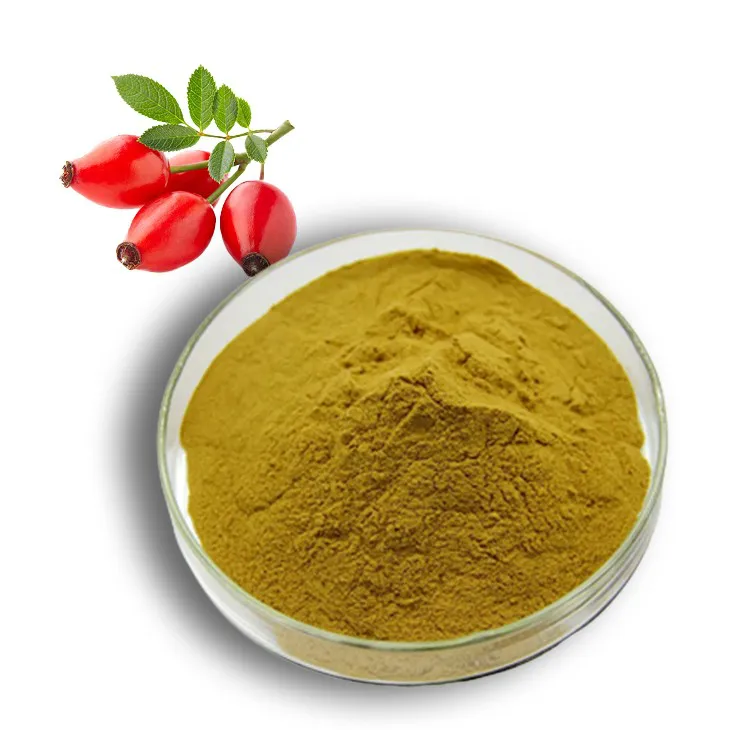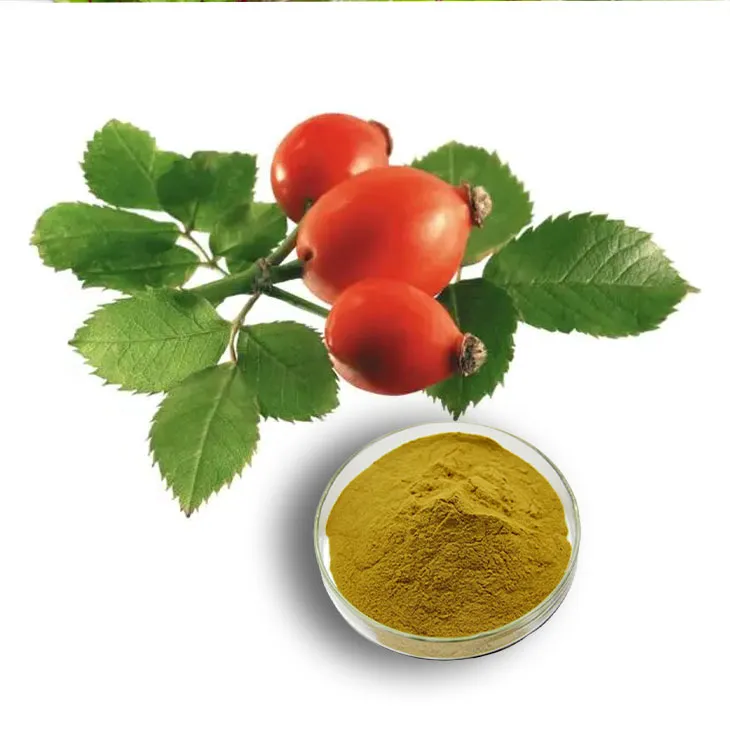- 0086-571-85302990
- sales@greenskybio.com
Expert Tips for Effective Wholesale Rose Hip Extract Purchasing.
2024-12-21

Introduction
Rosehip extract has gained significant popularity in various industries, including cosmetics, pharmaceuticals, and food supplements. When it comes to purchasing rosehip extract wholesale, it is crucial to make informed decisions to ensure quality, cost - effectiveness, and a reliable supply. This article will provide expert tips on various aspects of wholesale rosehip extract procurement.

Quality Assessment
1. Understanding the Source
The quality of rosehip extract often depends on the source of the rosehips. Wild - harvested rosehips are generally considered to be of high quality as they grow in their natural environment. However, it is essential to ensure that the harvesting is sustainable and legal. On the other hand, cultivated rosehips can also provide a consistent supply. Check the origin of the rosehips, whether they come from regions known for their high - quality produce. For example, rosehips from certain parts of South America and Europe are renowned for their excellent properties.
2. Extract Concentration and Purity
Rosehip extract comes in different concentrations. Higher concentrations usually imply a more potent product. Look for extracts with a clearly stated concentration level. Purity is also a key factor. Pure rosehip extract should be free from contaminants such as pesticides, heavy metals, and other impurities. Request certificates of analysis from the supplier to verify the concentration and purity levels. These certificates should be from a recognized laboratory.
3. Active Ingredient Content
The active ingredients in rosehip extract, such as vitamin C, flavonoids, and essential fatty acids, contribute to its various benefits. Check the content of these active ingredients in the extract. A high - quality rosehip extract should have a significant amount of these beneficial components. For instance, the vitamin C content can vary depending on the extraction method and the quality of the raw material. Compare different products based on their active ingredient profiles.

Supplier Selection
1. Reputation and Experience
Choose a supplier with a good reputation in the industry. Look for suppliers who have been in the business for a considerable amount of time. An experienced supplier is more likely to have reliable sources of rosehip extract, proper quality control measures, and a better understanding of the market. Check online reviews, industry forums, and ask for references from other businesses that have purchased from the supplier.
2. Certifications and Compliance
The supplier should hold relevant certifications. For example, in the food and supplement industry, certifications such as Good Manufacturing Practice (GMP) are essential. This ensures that the production process meets high - quality and safety standards. Also, check if the supplier complies with international regulations regarding the export and import of rosehip extract. Suppliers who are compliant are more likely to provide a consistent and legal supply.
3. Customer Service
Good customer service is an important aspect of supplier selection. A responsive supplier can answer your queries promptly, provide product samples, and offer after - sales support. In case of any issues with the product, such as quality problems or delivery delays, a supplier with excellent customer service will be able to resolve them efficiently. Test the supplier's customer service by sending an initial inquiry and observing their response time and the helpfulness of their reply.

Cost - Effectiveness
1. Price Comparison
When purchasing rosehip extract wholesale, it is necessary to compare prices from different suppliers. However, do not solely base your decision on the lowest price. Consider the quality and other factors in conjunction with the price. Create a spreadsheet to list the prices, quality parameters, and any additional services offered by different suppliers. This will help you make a more comprehensive comparison.
2. Volume Discounts
Most suppliers offer volume discounts for wholesale purchases. Find out the minimum order quantity required to qualify for these discounts. Calculate whether the savings from the volume discount offset any potential quality differences or additional costs. Sometimes, a slightly higher - priced supplier may offer better value when considering the volume discounts and the overall quality of the product.
3. Hidden Costs
Be aware of any hidden costs. These can include shipping fees, customs duties (for international purchases), and packaging costs. Some suppliers may offer a low product price but then charge high shipping fees. Make sure to ask for a detailed quote that includes all potential costs so that you can accurately calculate the total cost of the purchase.
Sampling and Testing
1. Requesting Samples
Before making a large - scale wholesale purchase, request samples from the supplier. This allows you to test the product's quality, flavor (if applicable), and performance. A reliable supplier should be willing to provide samples free of charge or for a nominal fee. When you receive the samples, conduct your own tests or send them to an independent laboratory for analysis.
2. Testing for Quality
Testing the rosehip extract samples is crucial. As mentioned earlier, test for concentration, purity, and active ingredient content. Additionally, test for any potential allergens if the extract is intended for use in products that may come into contact with sensitive individuals. The results of these tests will help you determine whether the extract meets your quality requirements.
Logistics and Delivery
1. Shipping Options
Consider the shipping options available from the supplier. Different shipping methods have different costs and delivery times. For perishable or time - sensitive rosehip extract, faster shipping methods such as air freight may be necessary. However, air freight is usually more expensive. Sea freight is a more cost - effective option for non - perishable products but has a longer delivery time. Discuss with the supplier to find the most suitable shipping option for your needs.
2. Packaging
The packaging of the rosehip extract is important for its protection during transit. Look for suppliers who use high - quality, durable packaging materials. The packaging should also be suitable for the type of product, whether it is in powder, liquid, or capsule form. Adequate packaging can prevent damage, leakage, and contamination of the extract.
3. Delivery Time
Ensure that the supplier can meet your delivery time requirements. A delay in delivery can disrupt your production schedule or marketing plans. Agree on a delivery schedule in advance and include it in the purchase contract. The supplier should be able to provide regular updates on the shipping status of your order.
Long - Term Relationship Building
1. Communication
Establish good communication channels with your supplier. Regular communication can help in resolving any potential issues, sharing market information, and planning future orders. Use email, phone calls, or video conferences to stay in touch with the supplier. A transparent and open communication style is beneficial for both parties.
2. Contractual Agreements
Have a clear and comprehensive contractual agreement with the supplier. The contract should cover aspects such as product specifications, quantity, price, delivery time, and quality control. It should also include provisions for resolving disputes. A well - drafted contract protects both your interests and those of the supplier.
3. Collaboration and Innovation
Consider collaborating with your supplier on innovation. For example, you could work together to develop new rosehip - based products or improve existing extraction methods. A collaborative relationship can lead to mutual benefits, such as cost savings, improved product quality, and a competitive edge in the market.
FAQ:
What are the main quality indicators to consider when purchasing rosehip extract wholesale?
When purchasing rosehip extract wholesale, several quality indicators should be considered. Firstly, the content of active ingredients such as vitamin C, flavonoids, and essential fatty acids is crucial. Higher levels of these components often indicate better quality. Secondly, purity is important. The extract should be free from contaminants like heavy metals, pesticides, and harmful solvents. Thirdly, the extraction method can affect quality. For example, extracts obtained through gentle and clean extraction processes are generally of higher quality. Also, the appearance and consistency of the extract can give some hints about its quality. A well - processed rosehip extract should have a uniform color and texture.
How can one find reliable suppliers for wholesale rosehip extract?
To find reliable suppliers for wholesale rosehip extract, start with research. Look for suppliers with a good reputation in the industry. You can check online reviews, industry forums, and business directories. Certifications are also important signs of a reliable supplier. For example, suppliers with GMP (Good Manufacturing Practice) certification are more likely to produce high - quality products. It's also advisable to ask for samples before making a large - scale purchase. This allows you to test the quality of the product directly. Additionally, consider the supplier's production capacity and their ability to meet your specific requirements in terms of quantity, packaging, and delivery time.
What is the typical cost range for wholesale rosehip extract and how can one ensure cost - effectiveness?
The cost of wholesale rosehip extract can vary widely depending on factors such as quality, quantity, and supplier. Generally, the price can range from a relatively low amount per kilogram for lower - quality or bulk - quantity purchases to a significantly higher price for high - purity, organically - sourced extracts. To ensure cost - effectiveness, it's important to compare prices from different suppliers while not sacrificing quality. Buying in larger quantities often results in lower per - unit costs. However, make sure that you can store the product properly to avoid spoilage. Also, consider long - term relationships with suppliers as they may offer better prices or additional benefits over time.
Are there any specific regulations or standards for wholesale rosehip extract?
Yes, there are regulations and standards for wholesale rosehip extract. In many countries, it must meet food safety and quality regulations. For example, it should comply with limits on contaminants such as heavy metals and pesticides. There may also be specific regulations regarding labeling, which should accurately represent the product's contents, origin, and usage instructions. In the case of extracts used in dietary supplements or pharmaceuticals, more stringent regulations may apply, such as requirements for clinical trials and proof of efficacy and safety.
How can one ensure the stability and shelf - life of wholesale rosehip extract?
To ensure the stability and shelf - life of wholesale rosehip extract, proper storage conditions are essential. The extract should be stored in a cool, dry place away from direct sunlight. Packaging also plays a role. Well - sealed, airtight packaging can help prevent oxidation and moisture absorption, which can degrade the quality of the extract. Additionally, some rosehip extracts may require refrigeration, especially if they are in a more liquid or semi - liquid form. Regular quality checks during storage can also help detect any signs of deterioration early.
Related literature
- Quality Assessment of Rosehip Extracts: A Comprehensive Review"
- "Supplier Selection in the Botanical Extract Industry: Focus on Rosehip Extract"
- "Cost - Benefit Analysis in the Procurement of Herbal Extracts: The Case of Rosehip"
- ▶ Hesperidin
- ▶ citrus bioflavonoids
- ▶ plant extract
- ▶ lycopene
- ▶ Diosmin
- ▶ Grape seed extract
- ▶ Sea buckthorn Juice Powder
- ▶ Beetroot powder
- ▶ Hops Extract
- ▶ Artichoke Extract
- ▶ Reishi mushroom extract
- ▶ Astaxanthin
- ▶ Green Tea Extract
- ▶ Curcumin Extract
- ▶ Horse Chestnut Extract
- ▶ Other Problems
- ▶ Boswellia Serrata Extract
- ▶ Resveratrol Extract
- ▶ Marigold Extract
- ▶ Grape Leaf Extract
- ▶ blog3
- ▶ Aminolevulinic acid
- ▶ Cranberry Extract
-
What is Cranberry Extract Good For?
2024-12-21
-
What Organ Is Cranberry Good For?
2024-12-21
-
Baicalin
2024-12-21
-
Grape Leaf Extract
2024-12-21
-
Chasteberry Extract
2024-12-21
-
Gynostemma pentaphyllum extract
2024-12-21
-
Green Tea Extract
2024-12-21
-
Mulberry leaf Extract
2024-12-21
-
Lycopene
2024-12-21
-
Lemon Juice Powder
2024-12-21
-
Carrageenan Extract Powder
2024-12-21
-
Red Date Extract
2024-12-21


























